Last Updated: 4 months ago
Looking for the best ways to stop a kitten from biting?
Maybe your new kitten keeps nipping you, and you’ve tried everything you could think of with no results?
Don’t worry, we’re coming to the rescue with eight proven and simple tips to stop your kitten from biting!
Just keep on reading.
8 Proven Methods For How to Stop Kitten From Biting
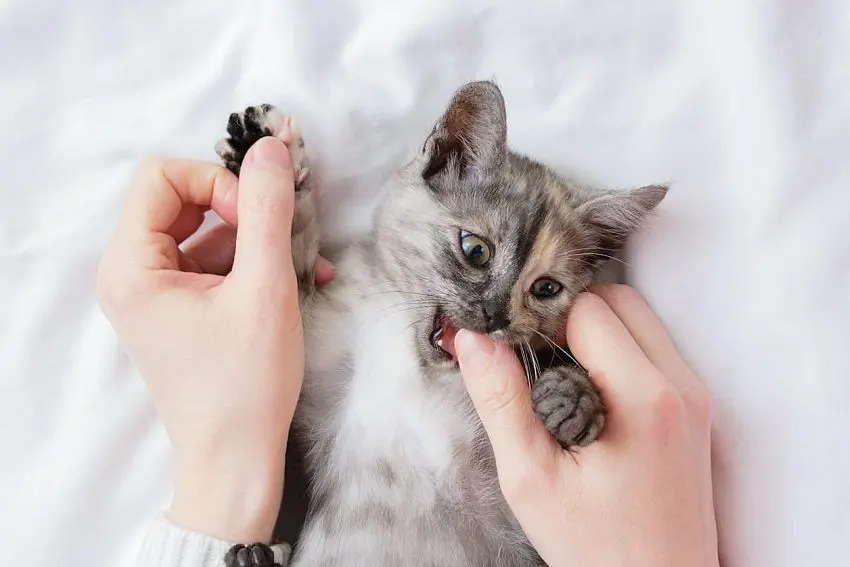
“Help! How can I train my kitten not to bite when we’ve tried everything?”
Let me reassure you first. Your kitten is the only one that suddenly turns into a little monster and starts attacking your legs and hands.
That’s pretty much how every kitten behaves at one point or another.
Since it’s not pleasant to walk around covered in bite marks, training your kitten to stop biting you is vital.
You just need to know a few secrets to survive kitten biting, and we’re here to reveal them to you.
1. Understand Why Your Kitten Bites
You can’t train your kitten not to bite because biting is as natural for kittens as playing is for children.
Instead, you need to teach your kitten to bite on appropriate objects and leave your hands and body alone.
To achieve this seemingly impossible task, you have to know why kittens bite to avoid making mistakes.
Overexcitement: The kitten is so caught up in the game that they can’t stop biting and attacking the “prey.” Trying to move away or leave the room is likely to get your kitty even more worked up.
Teething: Around the third month, kittens start teething and will gnaw on everything in sight, including your hair. Having appropriate teething toys at hand can make all the difference.
Petting aggression: Sometimes kittens get overly stimulated when you pet them and react by biting.
Illness: Rarely, kittens might also bite when you touch a tender spot on their body or when they’re ill and in pain.
2. Play with Your Kitten
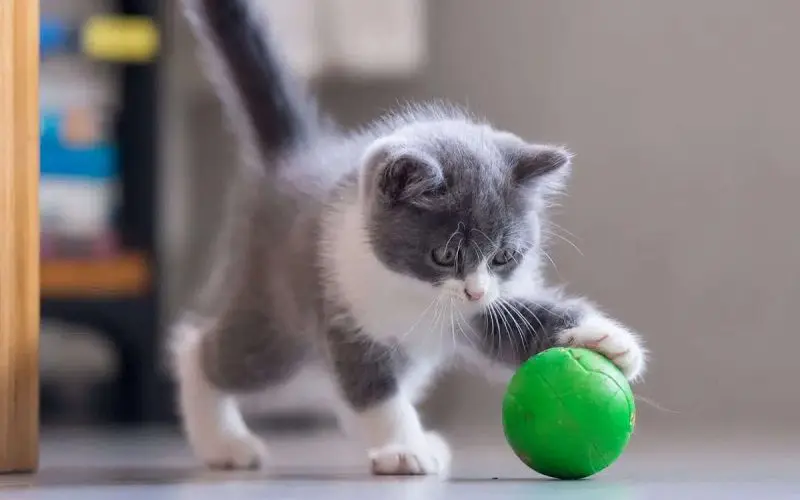
Rule number one when it comes to training kittens not to bite:
Play with your kitten as much as you can. It’s an excellent way to bond, establish trust, and prevent biting.
Bored kittens are bad news because they have too much pent-up energy.
Such kittens get overly excited when you finally start playing with them and are more likely to bite.
If you try to leave the room, they might follow and keep “attacking you.”
Moreover, unlike adult cats, kittens like to have company and prefer to have a play buddy.
Having mock fights is a favorite pastime, so when there’s no other cat around, you’ll have to do it. That’s your kitten’s logic.
To train your kitten to stop biting, you have to exhaust them until they don’t have the energy to gnaw on you.
Get toys and make your kitty run and jump as much as possible until you see that the little one is tired. Then you won’t have to worry about biting.
3. Redirect Your Kitten’s Attention
Another way to train a kitten not to bite is to redirect their attention to a toy. Get into the habit of carrying a toy with you all the time.
When you notice that your kitten is about to bite, redirect their attention to the toy.
This method is simple, but it requires consistency. It’s not enough to do it every other time; you have to do it every single time the kitten tries to bite.
Otherwise, your kitten won’t get the message. The secret also lies in choosing a suitable toy that your kitten will love.
Think of kittens as children. If they don’t like the substitute, they will go back to their original target.
Usually, kittens are fascinated by anything with features, like plush mice or strings.
But you’ll have to discover what appeals to your kitten’s senses by trial and error.
4. Reward good behavior
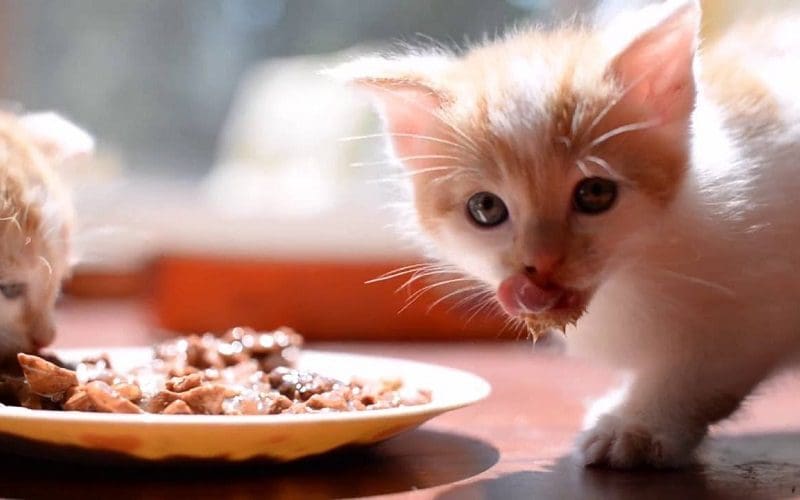
Many owners have trouble getting their kittens to stop biting because they’ve encouraged bad behavior for too long.
Allowing the kitten to jump on your hands or attack your pants’ strings is cute while they’re as big as your palm.
However, you’ll regret it later when an adult cat thinks your fingers are suitable gnawing toys.
You should establish that body parts are off-limits while the kitten is still young.
Move your hands away when the kitten wants to play with them, and leave the room when you notice that the little one is getting too excited.
Moreover, provide plenty of toys that your kitten can bite and tear apart.
Reward your kitten with treats and meals after playing to establish that toys are appropriate biting objects.
Be prepared that it will take time and that you have to be persistent.
Want to try making our own tasty nibbles for Kitty? Check out this easy homemade salmon cat treat recipe!
5. Play Hurt
If your kitten has learned bite inhibition from their siblings, you can use it to train your kitten not to bite.
When your kitten nips you, give a loud squeak and play it as if you’re severely hurt.
Usually, kittens will be startled by the noise and look up at you to see what’s wrong.
Don’t move your hand until the kitten lets go, or you’ll trigger their hunting instinct. Freeze and wait so that you’re not mimicking prey behavior.
The moment the kitten releases your hand, stop paying attention or turn your back to the kitten.
The point of this exercise is to show your kitten that biting means no fun and no play buddy.
6. Get Another Kitten
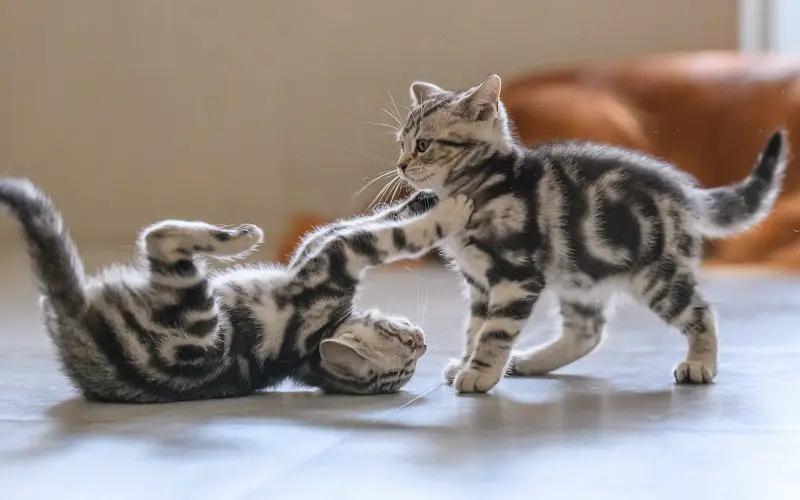
When kittens play with their siblings and mother, they learn to control the strength of their bite.
Otherwise, the other kittens or the mother retaliate with a slap or ignore the offender.
Unfortunately, abandoned kittens and those separated from their mother and siblings too early don’t get to learn this valuable lesson.
So they attack and bite with all their strength, even when they’re merely playing.
In such kittens, the usual methods for training them not to bite don’t work so well because the kittens don’t have the experience of being “punished” for biting.
What works when all other methods have failed is getting another kitten to teach your kitty manners.
A new kitten is a more exciting chasing target, and your kitten will quickly learn not to bite when they get slapped repeatedly.
7. Use Time Out
Besides playing hurt, you can use time-out to train a kitten not to bite and teach them what’s appropriate during a play session and what’s not.
When you notice that your kitten has the “I’m about to attack” face, you should stop playing.
Leave the room, turn your back to the kitten, or don’t pay them any attention. You want to send a clear message that you’re not interested in rough games.
The secret is to do it before the kitten becomes too excited and starts biting and clawing.
Otherwise, the kitten is already worked up and will follow you when you attempt to leave the room.
8. Don’t Punish

Many cat owners recommend slapping the kitten, using a rolled newspaper, getting a squirt bottle, or biting the kitten in return.
I don’t support such methods because physical force never works for training cats.
It’s never a good idea to startle a kitten because you don’t know how the cat will react.
The kitten might become so frightened that they become aggressive or hide under the bed for weeks.
Moreover, for your kitten to get the message that biting is bad, you’ll have to slap them every time it happens.
That’s going to damage your relationship and might make the kitten shy of human contact.
Wrap-Up
It’s possible to train a kitten not to bite, but it’s not going to happen overnight.
You’ll have to be consistent in how you respond to biting so that your kitten gets the right message.
Be gentle and patient, and talk to your vet if your kitten seems too aggressive.
What do you think about these eight best methods for how to stop kitten from biting? How did you teach your kitten to stop biting? Share your experience in the comment section.
Resources:
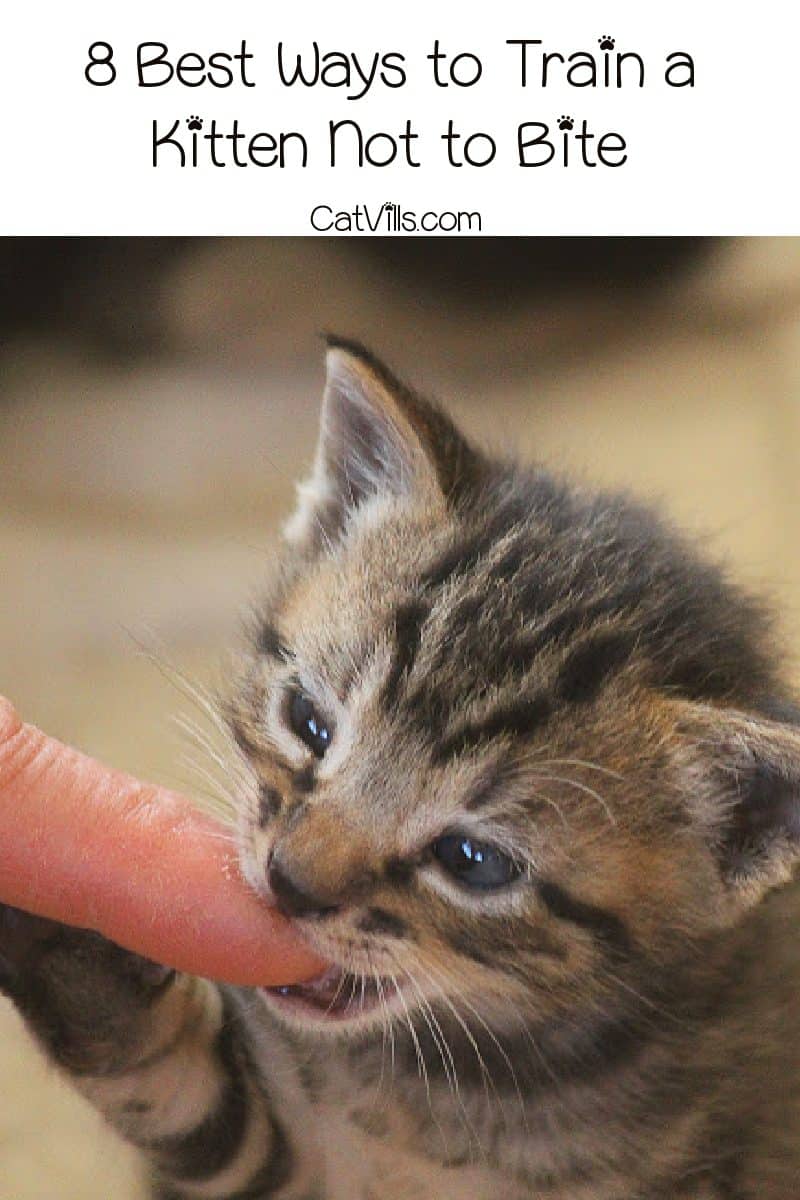

Olfa knows how to get things done and has a keen business sense that others admire. She’s always on the go, coming up with new ideas! Her ability to anticipate the needs of her readers and deliver information that they want is what makes CatVills such a success. She loves cuddling her cat Picaciu. He is her inspiration.
